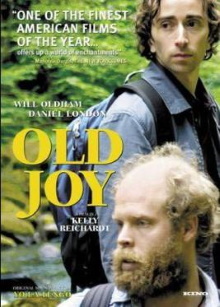Following up on the amazing First Cow which we both absolutely loved, here is an older film by the same director Kelly Reichardt and also set in Oregon. This is an even more minimalist film with basically just the two characters, plus a dog to liven things up a little. Not much happens here and really not that much dialogue either. Yet there is so much understated meaning in between these lines that you can sense how much effort has been put in crafting. Reichardt really is my favorite cinematic discovery this year and I sure as heck am putting more of her work on my list
Mark is relaxing at home when he receives a phone call from an old friend Kurt inviting him on a camping trip. Mark’s wife is pregnant and has reservations about him going off but doesn’t make a fuss about it. Mark takes his dog Lucy with him and goes to pick Kurt up. After stopping to buy some supplies they then head to a good spot that Kurt says he knows. Kurt’s directions turn out to be unreliable however so they end up getting lost and backtracking. When it gets dark, they are forced to just pick a random dump site to camp for the night. While drinking beer and messing around with an air gun, they talk about their lives. It is evident throughout the day that they are in different phases of their lives as Mark has a house, a steady job and is preparing to have his first child. Kurt however is still wandering aimlessly through life without fixed employment. Half-drunk, Kurt breaks down how a gulf has opened between them and they are no longer friends like they used to be. Mark seems confused and says they are friends like they have always been and Kurt backs down, saying that he is just being drunk and saying crazy things. The next day they get directions at a diner and make it to the hot springs Kurt wanted to show Mark.
This is very much the epitome of a film in which nothing much happens. Two old friends go on an overnight camping trip together, talk a bit and that’s it. There’s not even the snappy, pseudo-philosophical dialogue that some directors like to indulge in. The scenery in Oregon looks great but the camera doesn’t linger on and revel in the nature shots. If it weren’t for the dog Lucy coming along for the ride and happily doing the things that dogs naturally do, there are parts where the film may actually get rather boring. But even more so than in First Cow, this minimalism encompasses such a rich and deep understanding of human relationships. At its heart, this film is about two people who were once close friends but they are now drifting apart. Mark is moving on to a different phase in life and Kurt sees that Mark is now acting more reserved and holding himself back. But Mark as the person who is now, so to speak, adulting more responsibly, doesn’t see that their relationship is changing and professes confusion and ignorance when Kurt calls him out. This is a natural, normal part of life even when Kurt back off, either out of consideration for Mark or to save face for himself, but it’s so rare for a film to treat this mundane yet vital part of life with such delicacy and subtlety.
This sense of careful, considered craftsmanship permeates the entire film. The dialogue is so mundane but there are reams of meaning and intent underneath what is said. When Kurt is delighted that they have finally found the hot springs, Mark says that he never doubted him at all. But just by saying that he reveals that he was thinking about it. Throughout the trip Mark talks about his worries about starting a family and his work with the local community but Kurt hardly talks about how he is doing himself and Mark never asks. It’s evident that Kurt is having some serious problems and he needs some help or least some comfort from his old friend but Mark never acknowledges or even seems to be aware of his distress. As my wife notes, the film isn’t particularly condemnatory towards Mark, it treats it as just part of the natural flow of life and a low-key but brilliant way of pointing out that in real life relationships tend to fizzle out just like this in undramatic, unnoticed ways just like this rather than explosive confrontations.
In addition to its strength as a keen study of the human condition, the film also visibly incorporates the director’s love of Oregon. I note that Reichardt was not born in the state but she has chosen to set many of her films there. I think it is remarkable how films that are strongly tied to particular places, especially places that aren’t the usual ones represented on film, tend to be so uniformly excellent. It really makes a difference when a film is about a particular place at a specific time and a specific type of people rather than about generic people in some nameless place. I look forward to watching many more of Reichardt’s works.

2 thoughts on “Old Joy (2006)”